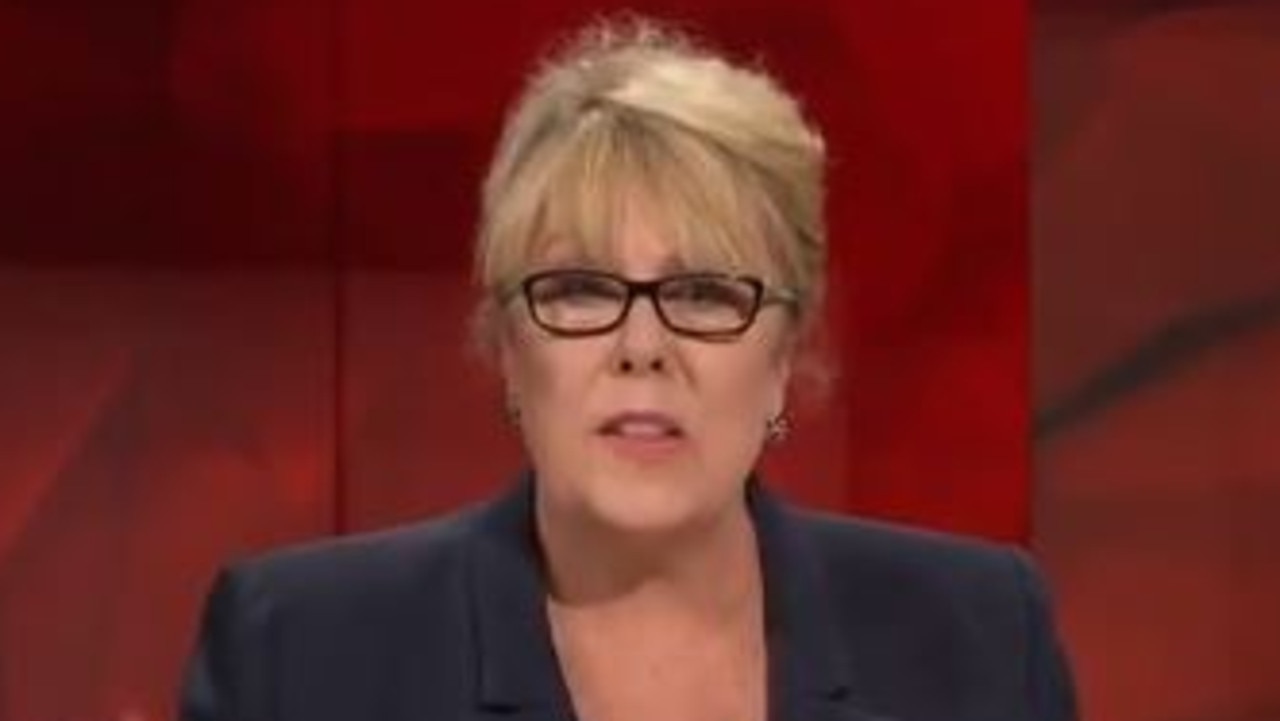Paul Barry slammed by editors for obsession with News Corp
SENIOR News Corp editors say Paul Barry is obsessed with the organisation after he attacked its papers in every episode.
SENIOR News Corporation editors say Media Watch host Paul Barry has an obsession with the news organisation after attacking its newspapers in all seven episodes aired this year.
Funded by the taxpayer, Media Watch is meant to provide impartial analysis of the media industry, examining conflicts of interest, deceit, plagiarism and abuse of power.
But, far from being an impartial host, Barry authored an anti-News Corp book, Breaking News: Sex, Lies and the Murdoch Succession, last year and has so far criticised News Corp’s newspapers in 11 out of 19 segments in seven Media Watch episodes broadcast since he took the reins as host on February 3 this year.
News Corporation is over-represented on the show, the remaining segments split between Today Tonight, tabloid television, Nine’s The Today Show, ABC’s reporting of the asylum-seeker burnt-hands fiasco, radio host Derryn Hinch, a story about the Sydney Opera House sinking, Seven Network’s possible payment for an interview with convicted drug-smuggler Schapelle Corby and jailed journalist Peter Greste. Barry, who earns a salary of $191,259, has only briefly scrutinised Fairfax, despite a bitter dispute unfolding between its executive team and major shareholder Gina Rinehart, while on the editorial front, major late-breaking stories are not being published in its newspapers because of new, early deadlines.
Under Barry’s watch, Media Watch has been forced to make three corrections in just seven 10-minute episodes, and has twice been accused of misleading viewers by selectively editing responses to push a story angle.
The Australian commissioned media intelligence firm iSentia to do an independent analysis of Barry’s Twitter feed for any perceived bias against News Corp.
iSentia’s group communications manager, Patrick Baume, said 30 of Barry’s 54 tweets in the past month related to News Corp. “His tweets have been dominated by the UK hacking trial, mainly following developments day by day,” he said.
“Ten were directly about The Australian and there were two each on the Chris Kenny defamation case and News Corp digital subscriptions. Fourteen out of 54 tweets by Barry over the past month had nothing to do with News Corp, its current or former employees anywhere in the world or were not linked to your stories.”
The Australian’s editor-in-chief, Chris Mitchell, said: “While The Oz had some disputes with Jonathan Holmes, mainly over his climate-change obsessions, he was at least a fair journalist, and presented the program with humour and good grace. Paul Barry’s work is not fair.”
The Daily Telegraph’s editor, Paul Whittaker, said Barry had an “irrational hostility” towards his newspaper.
“Barry, like his predecessor, appears to have an obsession with The Daily Telegraph,’’ he said. “No perceived error in The Tele is too trivial for Media Watch while similar or worse examples in other publications, particularly Fairfax, are regularly ignored.
‘‘Barry arrives at The Daily Telegraph’s coverage with a proven history of irrational hostility towards the paper and its parent company. In this, he is of like mind with the rest of his ABC comrades.”
Queensland’s The Sunday Mail editor, Peter Gleeson, said while Barry was a “fine investigative journalist”, and could easily work on Four Corners, he should not front Media Watch.
“It does seem a bit odd that the person who has written a book that essentially assassinates the character of News Corp is hosting a program that often looks at media bias,’’ Gleeson said.
In his book, Barry describes News Corp boss Rupert Murdoch as “a cartoon King Kong” and makes other unflattering remarks about his character.
Gleeson said Barry’s bias came through in the way the program selectively edited the right of reply.
“To prosecute their argument they selectively omit and edit your rebuttal. That’s not fair,’’ he said. “While they always post your full answer on the website, that doesn’t help the 500,000 who watch the show but don’t look at the website.”
Barry told The Australian he was not biased against News Corp and said he had described Mr Murdoch as a genius in an interview with the ABC.
“I am biased against illegal phone hacking and the abuse of media power,’’ he said.
“I tweet what’s happening in the hacking trial because it’s the biggest in British history. High-ranking journalists may end up in jail. There’s huge interest in what will happen.
“Media Watch has done stories critical of News Corp. We also get stuck into the ABC on a regular basis.
“And, yes, I am fit to host Media Watch. I’ve worked in the media for 40 years, in radio, TV, print and online. I’ve won two Walkleys and numerous other awards. I’ve earned my stripes.”
Barry has refused to apologise for selectively editing a video interview with Mr Mitchell to mislead viewers into thinking the newspaper did not have a profitable future.
The Australian has lodged a complaint with ACMA over this matter.
Barry dedicated a segment to The Daily Telegraph’s reporting of the Peter Slipper affair and the Press Council’s ruling on it.
While he was quick to jump on this complaint, which had been lodged by a third party, Margo Kingston, that wasn’t the case when ACMA ordered Media Watch to apologise to The Daily Telegraph in 2012.
“Jonathan Holmes and the ABC fought tooth and nail against an ACMA complaint made by Andrew Clennell to avoid being forced to apologise to The Daily Telegraph on air,’’ Whittaker said.
“He lost and it was the first time the ABC has had to make such an apology.”.
An earlier version of this article was published in error due to production issues. This is the correct version.



